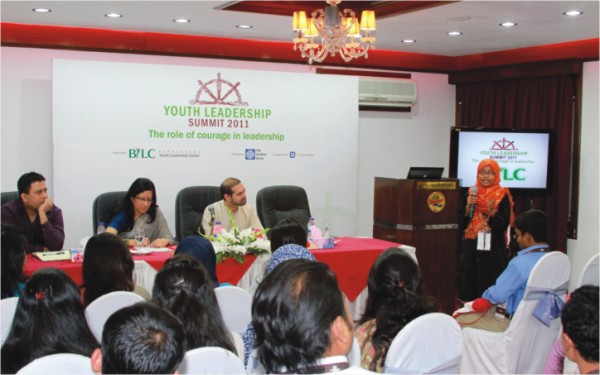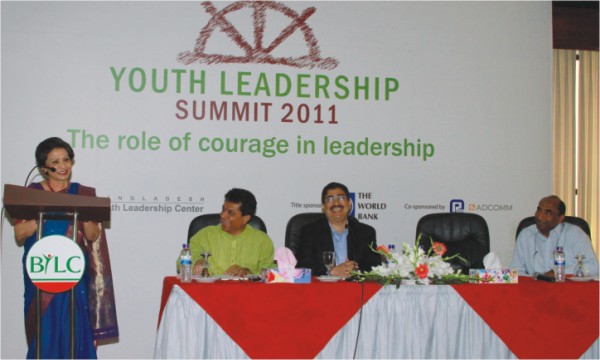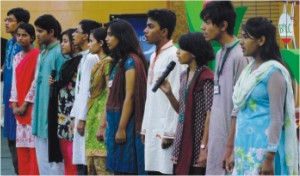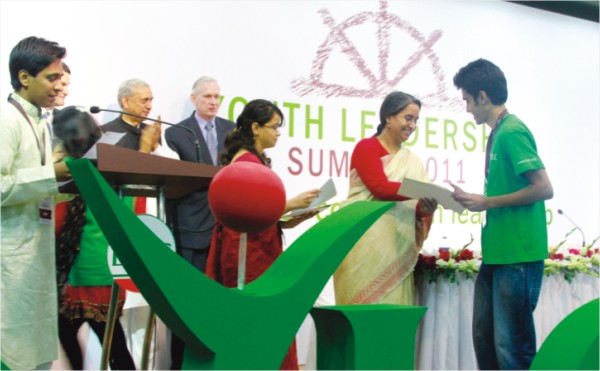| Spotlight

Making Breakthroughs
Sameeha Suraiya
Photo Courtesy : HYLC
At times of crisis, it has been the way of the world to look upon a nation's younger generation to step up and walk the roads of change. Their voices never went unheard as they stood strong in their resolve to thwart all forms of injustice. While the birth of Bangladesh is largely due to the contributions made by her young men and women, the influence that the youth can bring into effect is incontestable. The tumultuous years between 1952 and 1971 will have not been possible had it not been for the power of the young Bangalis, which when unleashed, had the capacity to uproot all the evil forces and bring back honour and a new found identity. It is through the brave leadership of the youth that dreams are sown and reform flourishes. It is with this belief that Bangladesh Youth Leadership Centre (BYLC) began its first steps towards a journey that is both challenging and inspiring.

Hafiz G. A. Siddiqui shares his views on Education and Career
The month of March holds a special significance for all Bangladeshis; March remains as a reminder of the courage of the youth. The events that took place in the year 1971 continue to shape our thoughts and identities. The Youth Leadership Summit 2011, organised by BYLC on March 3-5 at Spectra Convention Centre, brought together young students from diverse education and socio-economic backgrounds, highlighting the theme of Courage. What better time of the year to usher in a summit for the youth than the month of March, a month that was principally about the driving force of young souls.
 |
Delegates at the summit. |
The concept of a youth leadership centre was originally developed at Harvard University's Kennedy School of Government back in January 2008. Founder and President, Ejaj Ahmad, then a graduate student of Kennedy School of Government at Harvard University, acted upon his desire to work with the younger generation of Bangladeshis for a tolerant and just society. The first programme titled Building Bridges through Leadership Training was carried out in 2008, and since then there has been no looking back. Not only was BYLC born, but it also found international recognition. Today, graduates of BYLC are internationally recognised. Besides bridging the three mediums of education, BYLC also provides training in leadership and most importantly, helping participants to serve in their own communities and thus, perform their parts as active citizens.
The Youth Leadership Summit of BYLC, the first of its kind, is the result of the commendable success of its objectives. 50 speakers joined hands with 200 delegates to initiate what truly was an awe-inspiring movement. 3 days of engaging activities and sessions that consisted of remarkable men and women on the panels as they shared their stories of finding success and happiness to a young audience, is surely one of the ways that ensure enlightenment and progress in a society. With highly engaging team-building activities and enough time in between the sessions for conversations to flow, delegates had the opportunity to connect with their fellow members and exchange views with the distinguished guests.

A delegate asks a question to the Media and Journalism panel.
The grand hall came alive as delegates upon finishing registrations, found their IDs and excitedly took their seats. Ejaj Ahmad who was on the panel, kept his welcoming remarks, stating how every choice that an individual makes has an effect later on. He urged the delegates to hold close the qualities humility and respect, two most essential ingredients of a great leader. Mohamed Mirajul Quayes, Foreign Secretary of Bangladesh and a founding member of the international advisory board of BYLC, spoke on the all-encompassing qualities of good leadership, “We mush go forward with inclusiveness. Leadership comes from within, front and the back. One should fulfil whatever is in one's capacity and move towards progress without pulling down another.” Prof. Abdullah Abu Sayeed, Founder, Bishya Shahitya Kendra, was also on the panel. His speech proved to be an eye-opening one. Pointing out the theme of the summit, the one most powerful quality of competent leadership, he elaborated on the role of courage. “Emancipation begins with someone standing up. Cowards have never been known to lead. Instead of stressing one's strengths, recognise the weaknesses and what ails us. Only then will you be able to achieve victory.” His profound messages surely stirred a lot of young hearts present in the audience.
 |
One of the energetic exchanges between a delegate and the panelist. |
Ice-breaking activities right before the plenary sessions began helped boost the team spirit and ignite enthusiasm. Conducted through the top-notch expertise of Quazi M. Ahmed, Consultant and CEO of FutureLeaders, and a man who knows his job as a motivational speaker extremely well, delegates snapped out of their shells and partook in interactive, sometimes hands-on, tasks that encouraged them to think a little differently, and which most definitely, were full on fun. One team-building activity included untying oneself from a handcuff made out of a string that was tied with the handcuff of the partner. Participants, in order to disentangle, were seen to try all kinds of techniques, giving way to much amusement. Through a slide presentation, Ahmed also presented images and videos that upheld the necessity of co operation, perseverance and patience for a team to work successfully.

Panelists of Global Citizenship speak words of courage and unity in this modern day.
With the belief that a leader of today stands incomplete without an understanding of a wide range of disciplines, and taking into account that most of our problems are inter-connected, plenary sessions addressing a variety of fields were arranged. Delegates listened and shared ideas with high-profile speakers on the panel. The sessions addressed the ideas of global citizenship, entrepreneurship, human rights and ethics, media and journalism, climate change, politics, liberation war, health and innovation. Great stories emerged out of each session, followed by a lively round of answering questions from the audience. All the 50 speakers have appeared successful, upon standing courageous for what they believed in.

Geeteara Safiya Choudhury speaks during the Enterpreneurship session.
The session Global Citizenship was chaired by Farooq Sobhan, President, Bangladesh Enterprise Institute, who introduced the panellists - Dr. Justin Lee, Australian High Commissioner to Bangladesh, Nihad Kabir, Senior Partner, Syed Ishtiaq Ahmed and Associates and Dr. Sanjay Kathuria, Lead Economist, The World Bank. The session brought into view global economic issues and its impact on Bangladesh, our economic prospects in the global market and the role of foreign investments. Dr. Justin Lee was full of optimism. Upon expressing the idea that it is only those with courage who serve without seeking rewards, he urged to lead by example, because actions speak louder than words. Technology and innovation were also mentioned as important areas of competence to be a global citizen. Nihad Kabir talked about the significance of taking pride in one's identity and culture in order to stand confident in the world outside. She mentioned that culture is not static, and that we must open ourselves to new experiences in different cultures: “Globalisation is based on huge transfer and access to information. Everybody is accountable; we are connected to the world by increasingly new and different ways everyday.” Globalisation probably stands as the most debatable topic of modern age. While some glorify it, there are others who mourn over the loss of one's own culture and his roots. Dr. Sanjay Kathuria struck the balance saying that globalisation is here to stay and that we have to learn to maximise its benefits while minimise its negative impacts. He feels the youth needs to understand the dynamics of globalisation and develop policies to deal with it: “We should be issue-based and be careful about facts and not act upon personal judgments.” Farooq Sobhan, as a concluding remark, reinforced the idea of how leadership and change can take place from any sector and position; one does not have to get into politics to lead the country.

US James F. Moriarty, US Ambassador to Bangladesh addressing at the closing ceremony.
The session Enterpreneurship proved to be another very successful session with Mamun Rashid, Former CEO, Citibank NA, and among the panellists, Geeteara Safiya Choudhury, Chairman, Adcomm Limited, A.K. Azad, President of The Federation of Bangladesh Chambers of Commerce and Industry, and Niaz Rahim, Group Director, Rahimafrooz.
 |
BBLT (Building Bridges Through Leadership Training) Junior students singing the national anthem during the closing ceremony. |
A.K. Azad recalled the struggles early on in his career as he opened a garments factory while pursuing an honours degree. From paying worker's salaries on debt, Azad, through patience and perseverance, stuck to his goal and was one day, elected as the youngest president of BGMEA. He is also the Managing Director of Hameem Group, one of the five biggest exporters in the country. The next speaker, Geeteara Safiya Choudhury, shared the problems she faced as a working woman in the early 70's. Her presence would sometimes welcome resentment from total strangers. Upon abandoning attractive offers from international organisations, she chose to serve her country. It is her deeply rooted values that pushed Choudhury to be one of the leading entrepreneurs of Bangladesh today. Neaz Rahim, the second generation of Rahimafrooz echoed similar thoughts while considering the true spirit of entrepreneurship. From humble beginnings to the second largest battery company in Asia, the company had striven to gain trust first and foremost. He shared the belief that businesses and enterprises, no matter how powerful, cannot flourish nor have a sustainable future if ethical values go unheeded.

BBLT 4 students from Chittagong receives BBLT graduation certificates from Dr. Dipu Moni.
The Youth Leadership Summit concluded its impressive journey at the Bangladesh International Conference Center. Foreign Minister, Dr. Dipu Moni was present as the chief guest in the event. Dr. Gowher Rizvi, Member, International Advisory Board of BYLC and International Affairs Advisor to the Prime Minister of Bangladesh, and James F. Moriarty, US Ambassador to Bangladesh were also present in the event. Dr. Dipu Moni praised BYLC for its efforts to contribute to the youth leadership development in Bangladesh: “The future of Bangladesh lies in the youth of today and a leadership summit of this magnitude will definitely help to create more responsible, knowledgeable and active citizens in Bangladesh.” Dr. Gowher Rizvi is remembered for his words: “Contrary to popular belief, real leadership is not about position or authority - it is about creating change in society by positively impacting the lives of others.”
The indomitable spirit of Bangladeshi youth had once fulfilled its urgent duties towards its motherland. Today, it still pledges to work for the country, leaving aside all personal entanglements. BYLC Youth Leadership Summit provides such a platform that generates not only global leaders, but also upholds the precious values that make a true leader.
MEETING THE FOUNDER
 |
Photo Courtesy : EJAJ AHMED |
What was the basic idea behind the founding of BYLC?
The core idea was to train the next generation of home-grown leaders. It was founded with a vision for an inclusive society, uniting youth from diverse educational and socio-economic backgrounds, equipping them with leadership skills and engaging them in public service and active citizenship. BYLC tries to create a competent and compassionate generation. For our first summit, we chose Courage as our theme, because it stands as one of the fundamental virtues of a good leader. Courage is about respecting values and norms, and at the same time, stepping out of our comfort zones to address and meet the demands of our nation.
Wherein do you think lies the problems in our education environment?
The most fundamental problem is the divide that exists among the younger generation. Due to the three mediums of education, realities are different which inevitably leads to a lack of understanding. Conflicts in class also exist, giving rise to problems among students of the younger generation. The divisiveness among the three different mediums of education prevent the co operation necessary to move our country forward. There also is a lack of respect. Respect is one of the ideas that we promote. It can be built when a group is working for a common cause. All young Bangladeshis should focus on the common values and purposes patriotism, value-driven leadership and active citizenship being a few. These values can unite people from the most diverse of backgrounds.
What do you think are our strengths?
Our strength lies in our diversity. The approaches that our participants offer to problem-solving are various, which is great. Different experiences and perspectives make us stronger. Diversity is a strength if used the right way.
What were the key objectives of Youth Leadership Summit, 2011?
The summit was targeted towards students. It was arranged with a view to bridging the inter-generational gap. The summit brought together two generations, and exchanges took place both ways. Sharing of knowledge, a key objective of the summit, has to take place in order to build competent leaders. Bangladesh faces complex developmental challenges, and to address them, current and future leaders will need to have multi-faceted competence across many disciplines. To be a leader, knowledge has to be combined with compassion. The purpose of the summit was also to help the young delegates make informed choices about their lives and careers, because it is these choices that will go on to shape Bangladesh another 40 years from now. And of course, networking was also the next most important objective of the summit. Delegates had the opportunity to be up close and personal with the speakers who shared their stories and opinions at the event.
|
Copyright (R) thedailystar.net 2010 |

